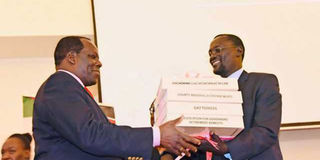Oparanya promises to push for the referendum as he takes helm at CoG

Outgoing Council of Governors chairperson Josphat Nanok (right) hands over to his successor, Mr Wycliffe Oparanya, on January 14, 2018. In the first three months of this financial year, 24 counties did not did not incur any expenditure on projects. PHOTO | EVANS HABIL | NATION MEDIA GROUP
What you need to know:
The Kakamega governor was elected to replace Turkana’s Josphat Nanok.
He also sent a warning shot to the Treasury, saying under his term, it will not be business as usual when it comes to flow of funds to the counties
Mr Oparanya, who is also Orange Democratic Movement deputy party leader, will be deputised by Murang’a’s Mwangi Wa Iria.
A promise to lead a strong push for a referendum, as well as his consistent statements against the Treasury’s delayed disbursements to the devolved units catapulted Kakamega Governor Wycliffe Oparanya to the helm of the powerful Council of Governors on Monday.
Mr Oparanya, who is also Orange Democratic Movement deputy party leader, will be deputised by Murang’a’s Mwangi Wa Iria. Wa Iria replaces Kirinyaga’s Anne Waiguru. Makueni governor Kivutha Kibwana was elected Chief Whip, replacing Marsabit’s Mohamud Mohamed.
DEFIANCE
The Kakamega governor was elected to replace Turkana’s Josphat Nanok following the governor’s decision not to honour a ‘gentleman’s agreement’ made in December 2017 to have Mr Nanok relinquish the leadership to Kwale’s Salim Mvurya in July 2018.
Mr Nanok refused to quit, saying, the council did not provide for a transition clause, and instead offering himself for a second and final term.
Mr Oparanya was running against Mr Nanok and governors Anyang’ Nyong’o (Kisumu), Jackson Mandago of Uasin Gishu and Ms Waiguru.
Ms Waiguru was the first to opt out of the race, leaving the four men to square it out to the exclusive club that has had Isaac Ruto of Bomet (2013-2015), Meru’s Peter Munya (2015-2017) and Mr Nanok, who served from December 2017.
Mr Ruto and Mr Munya had mastered the art of political defiance, and had adopted a combative leadership, openly criticising the national government on various matters touching on devolution.
Yesterday, Mr Oparanya started his term with a promise of a similar defiance, with his first port of call being a referendum push, similar to the Pesa Mashinani (money to the counties) campaign by both Mr Ruto and Mr Munya.
“One of the key issues I have prioritised is the reshaping of the referendum national agenda in the context of devolution,” Mr Oparanya told his colleagues in his maiden speech at Movenpick Hotel in Westlands, Nairobi.
AMENDMENTS
He said: “The council will purposely endeavour to drive the referendum discussion by engaging stakeholders.”
Proposed amendments
To sustain and shape the referendum debate, the governors have formed a committee to study the 2010 Constitution, as well as the proposed amendments so as to suggest their own.
The committee is chaired by Prof Kibwana and Meru governor Kiraitu Murungi. The two governors are among the country’s most respected legal brains.
The county bosses want to take advantage of the March 2018 handshake between President Uhuru Kenyatta and Mr Odinga, which has been said will lead to a referendum, to push their own plebiscite agenda for more funds to the devolved units.
Mr Oparanya also sent a warning shot to the Treasury, promising a bruising war on the disbursement of funds.
“We want to tell Treasury that under my term, it will not be business as usual, especially when it comes to flow of funds to the counties,” Mr Oparanya said.
He also promised to ensure that the thorny issue of e-procurement under the Integrated Financial Management System (Ifmis), which has almost always ground operations in the counties to a halt, is addressed.
DISBURSEMENTS
Mr Nanok, in his last speech, defended his tenure, saying, he had helped steer the devolution boat in the right direction after the 2017 elections.
He also complained about delayed disbursements to counties and what he said was failure by the National Assembly to stick to agreements on various Bills.
He specifically mentioned the County Retirement Scheme Bill, which, he said, went against agreements made on the pension management for county governments’ employees.
He cited the rolling out of the regional economic blocs, the finalisation of the 2017 guidelines for the management of intergovernmental fiscal transfers and improved partnerships with development partners and the Judiciary as some of his successes.
Ms Waiguru said Kenya had matured as a democracy, and that under Mr Nanok and herself as the deputy, the council had “earned a reputation as the champion of devolution.”
“There is no other institution in the country that is best placed to champion devolution and safeguard its principles as we can,” Ms Waiguru, said, thanking her colleagues for her tenure as vice-chairman.





